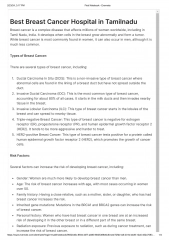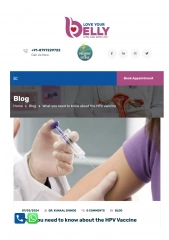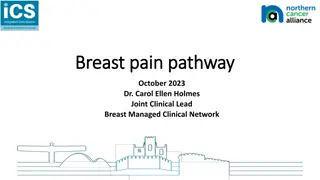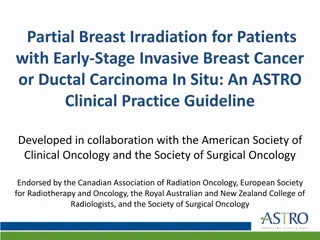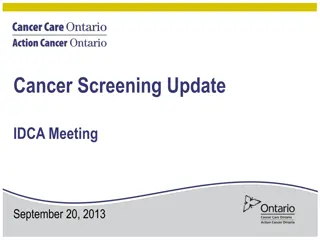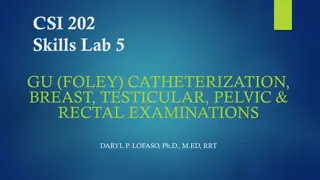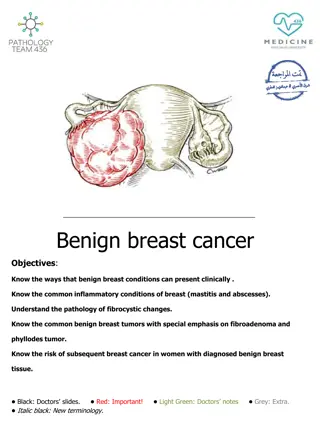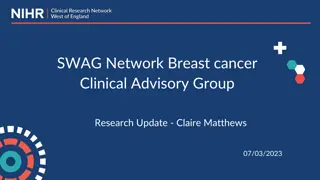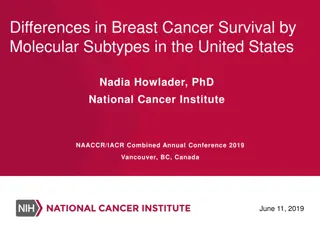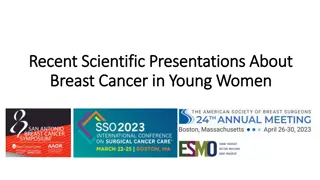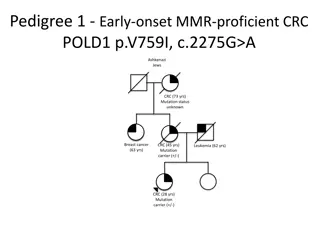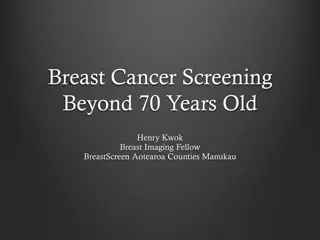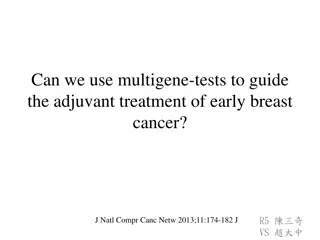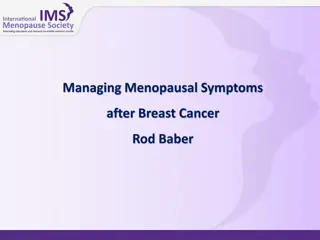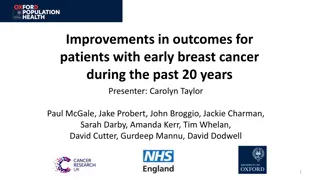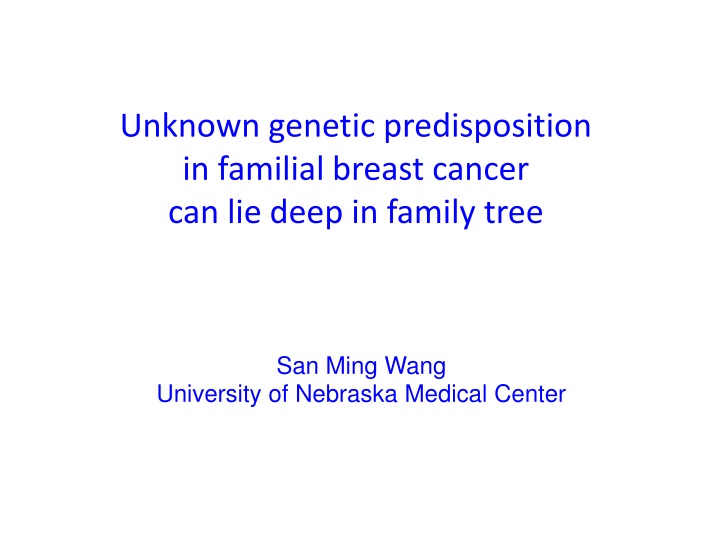
Unraveling Familial Breast Cancer Genetics
Genetic predisposition plays a key role in familial breast cancer. Efforts to identify unknown predispositions through various methods have yielded limited results, with newly identified predispositions being rare. This rarity poses challenges for distinguishing between different genetic factors contributing to the disease.
Download Presentation

Please find below an Image/Link to download the presentation.
The content on the website is provided AS IS for your information and personal use only. It may not be sold, licensed, or shared on other websites without obtaining consent from the author. If you encounter any issues during the download, it is possible that the publisher has removed the file from their server.
You are allowed to download the files provided on this website for personal or commercial use, subject to the condition that they are used lawfully. All files are the property of their respective owners.
The content on the website is provided AS IS for your information and personal use only. It may not be sold, licensed, or shared on other websites without obtaining consent from the author.
E N D
Presentation Transcript
Unknown genetic predisposition in familial breast cancer can lie deep in family tree San Ming Wang University of Nebraska Medical Center
Genetically defined breast cancer Sporadic Breast Cancer caused by somatic mutation 90% of breast cancer bad luck Familial Breast Cancer caused by germline mutation 10% of breast cancer - inherited http://www.cancer.gov/types/breast
Familial Breast Cancer In 1866, French physician Paul Broca reported 10 women over four generations in his wife s family died from breast cancer
Genetic predisposition is the major factor for familial breast cancer Factors contributing to cancer include environment, life style, nutrition, infection, genetics etc. Genetic predisposition is considered as the major factor responsible for familial breast cancer Familial breast cancer is a genetic disease
BRCAx familial breast cancer Germline mutations in BRCA1 and BRCA 2 genes are known genetic predispositions for familial breast cancer Germline mutations in BRCA1 and BRCA 2 genes are present in 10-20% of familial breast cancer Predispositions for 40-50% of FBC are known Predispositions for 50-60% of FBC remain unknown
Efforts made to identify the unknown predispositions linkage analysis, positional cloning, genomic arrays, targeted sequencing, GWAS, exome sequencing have been applied Large sample sizes of tenth of thousand cases per study are routinely used Newly identified predispositions are very limited
Newly identified predisposition are all rare BC cases Predisposition BC cases References with mutation XRCC2 3,371 5 Park et al, 2012 XRCC2 3,548 0 Hilbers et al, 2012 FANCC 1,435 1 Tompson et al, 2012 BLM 1,435 4 Tompson et al, 2012 BRIP1/BACH1 357 2 Cao et al. 2010 PPM1D 6,634 21 Ruark et al. 16,789 33 (0.5%) Total
The rarity makes it indistinguishable between disease and normal population Identified rare germline mutations in XRCC2 in 5 out of 3,371 BRCA1/2-negative familial breast cancer cases. (Park, et al. Am J Hum Genet. (4):734-9, 2012) The same mutation failed to be detected in another 3,548 BRCA1/2-negative familial breast cancer cases but in 1 of 1,435 normal control (Hilbers et al. J Med Genet. 49(10):618-20, 2012)
Current theory to explain germline predispositions in familial breast cancer High-risk genes: rare mutations convey high- risk, such as BRCA1; Intermediate-risk genes: rare mutations convey intermediate risk, such as CHEK2; Modest risk genetic variants: common genetic variants such as the SNPs detected by GWAS population studies
Distribution of known genetic predispositions Fanale et al. Oncogene 31(17):2121-8, 2012
Question: frequency of unknown predispositions Existing ? 100% 40%
Hypothesis: Unknown predisposition can be family-specific FBC is an autosomal dominant disease Each family is enriched with the predisposition Focus on family may have higher chance to identify the unknown predisposition than population screening (diluted)
Exome sequencing Next-generation sequencing-based >180,000 exons from around 20,000 genes in the human genome 1/100 genome DNA content 1/5 cost of sequencing whole genome ($1,000) 85% of known genetic diseases are caused by mutation in exon ! Genome Exome Sequencing Next-generation DNA sequencing
Germline mutations in three BRCAx families are highly family-specific
Putative genetic predisposition in each BRCAx family Gene Family 1 PINK1 USP28 TIGD2 Family 2 KAT6B KAT6B NOTCH2 Family 3 ADCY9 PHKB NANP PPP6R2 Position Change Distribution chr1:20972051 chr11:113683049 chr4:90034310 - - - + + - + + - - - - - - + - - + -2A>G A>G C>T chr10:76789128 chr10:76789311 chr1:120459167 G>T C>T C>T + + + + + - + + - + + - + + - + + + chr16:4016224 chr16:47628126 chr20:25596725 chr22:50857867 G>A +1G>T A>G C>A + + - - - - + - + - + - - + - + - - - +
KAT6B A histone acetyl-transferase Its N-terminal is involved in transcriptional repression while its C- terminal is involved in transcriptional activation Interacts with important transcriptional regulators RUNX1 and RUNX2. A component of the MOZ/MORF complex involved in DNA replication, transcriptional regulation, and epigenetic modification of chromatin structure Mutations cause several neural genetic disease Not known involved in familial breast cancer
Are the same germline mutations in KAT6B also present in other BRCAX families? 42 additional cancers from 26 BRCAx families were tested None of the mutations are present in these families Sequencing entire KAT6B gene see no mutations
Distribution of germline mutations in 26 BRCAx families
Each BRCAx breast cancer family may have its own genetic cause Familial-specific predisposition 40% 100%
Genetic predispositions in familial breast cancer: Same Disease, Different Causes Common predispositions only exist in a portion of familial breast cancer Family-specific predispositions are responsible for many familial breast cancer Family-based approach can identify the unknown predispositions Precision medicine, personalized medicine, familial medicine . BRCA1 TNRC9 FGFR2 BRCA2 PALB2 ATM P53 CHEK2 PTEN Wen et al. BMC Cancer. 2014 ;14:470
Contribution University of Nebraska Med Center Yeong C. Kim Bradley Downs Hongxiu Wen Fengxia Xiao Peixian Chen Jiangtao Luo San Ming Wang Creighton University Carrie Snyder Mark Stacey Dina Becirovic Henry Lynch

